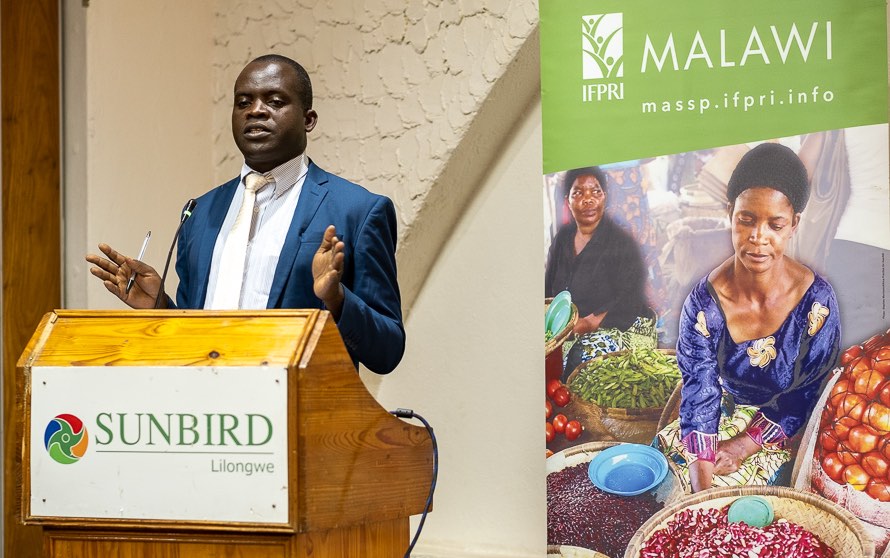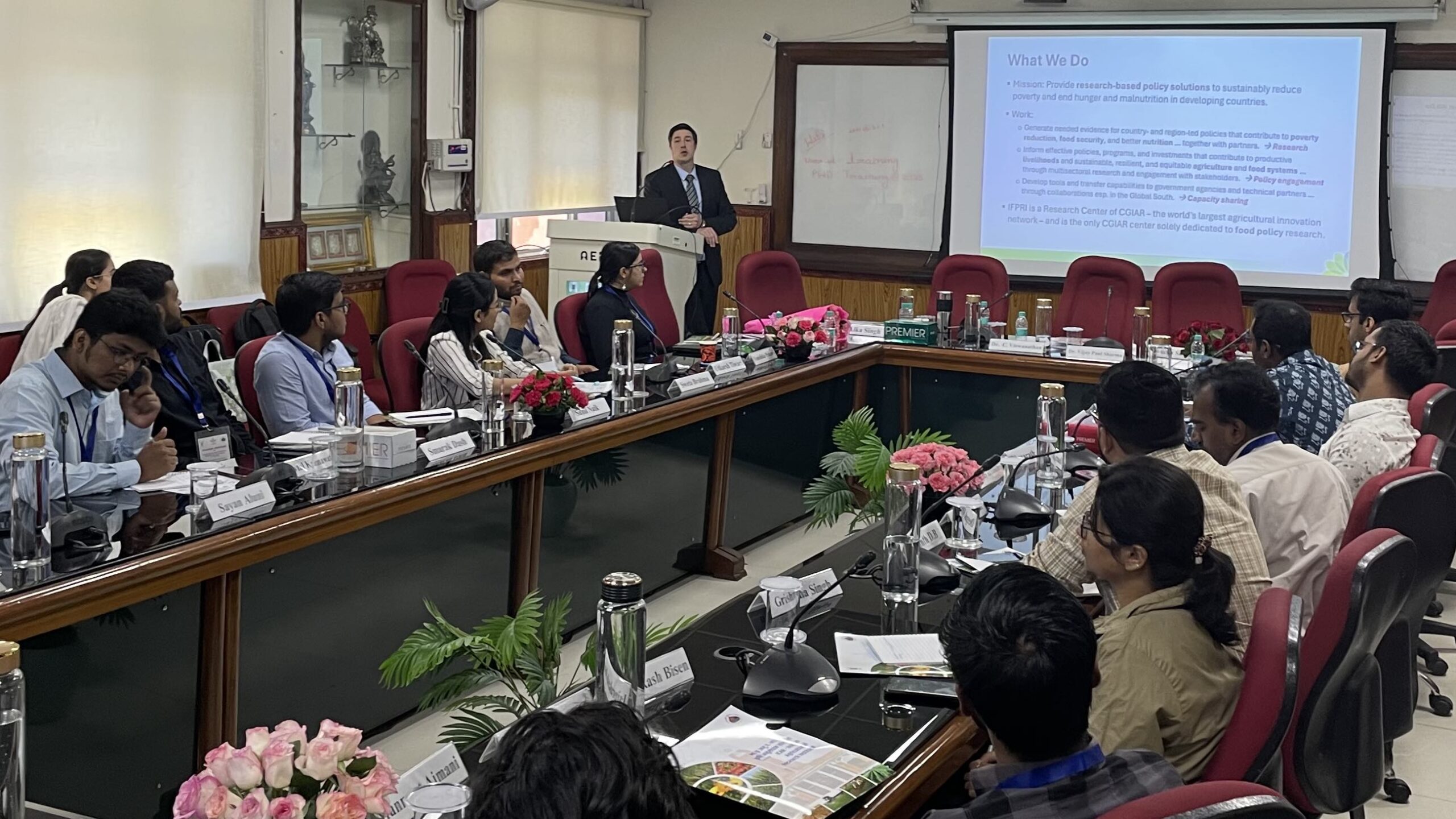Agricultural extension services are among the most important factors driving smallholder farmers’ development. Extensive consultative processes during the drafting of Malawi’s National Agricultural Policy (NAP) (2016-2020) identifies the relative weakness of the country’s extension services as a major constraint, but also says they have the potential to increase productivity and contribute to Malawi’s agricultural transformation. The National Agricultural Investment Plan (NAIP) (FY 2017/18-2022/23), highlights major investments needed to strengthen institutional capacity and revitalize extension services.
However, little was known about the overall impact of extension services on the development outcomes set forth in the NAP and NAIP. To fill this knowledge gap, in 2016 IFPRI and partners launched a three-year evidence-based policy support project to analyze demand for and supply of agricultural extension services in Malawi and help design activities to strengthen service providers’ capacity to address farmer’s demands for information. The study collected two rounds of nationally representative panel data involving 2,880 households in 2016 and 2018, two rounds of focus group discussions, a census of extension service providers in 15 districts, and a series of in-depth interviews.
To mark the finalization of the study, validate and disseminate the findings, IFPRI Malawi organized an end of project event on Nov. 13 in Lilongwe.
Opening the event, Pearson Soko, Senior Agribusiness Officer in the Department of Agricultural Extension Services (DAES) of the Ministry of Agriculture, Irrigation and Water Development (MoAIWD), highlighted the important role of agricultural extension in Malawi and the importance of this study, which can be used to guide future projects. He called on all extension services stakeholders to work to improve the lives of smallholder farmers in Malawi.
IFPRI Senior Research Fellow Catherine Ragasa, the project leader, presented on the study’s key findings, highlighting six positive trends: (1) high coverage of extension services, comparable to Ethiopia and much higher than Uganda; (2) improvements in access to extension services for women and men, youth and adults; (3) consistently high ratings from farmers on services’ usefulness; (4) more diversity in extension messages; (5) greater use of cost-effective tools, such radio and group approaches and (6) greater crop diversification.
However, national trends also reveal areas for improvement. While extension services led to greater technology awareness, this did not translate to significant adoption of technologies and related management practices. Farm productivity, food security, and commercialization also remain low.
Unpacking the results, it is clear that receiving quality advice along with greater knowledge of certain technologies leads to greater adoption, higher productivity, and food security, Ragasa said. Specifically, she noted, agricultural and nutrition information from radio programming affects organic fertilizer use and dietary diversity; access to marketing extension affects crop diversification; and combining different sources of advice and extension approaches affects the adoption of some technologies at the national level.
The study found that exposure to lead farmers (who are elected by villages to voluntarily help in promoting good agricultural practices) and the number of lead farmers in the community did not have an effect on technology adoption at the national level. However, the quality of lead farmers plays a big role here. An effective approach requires regular training, support from Agricultural Extension Development Officers (AEDOs) and community leaders, and a transparent and participatory selection process. Village Agricultural Committees (VACs) face a similar situation, Ragasa said. Overall, presence of VACs did not have an impact on technology adoption at the national level, but the study found that active and responsive VACs with strong grassroots organizations are associated with greater technology adoption.
Overall, Ragasa said, there is a long way to go: “The studies reveal numerous pockets of successes, but these remain exceptions rather than rules. Huge challenges remain to replicate, scale, and accelerate these pockets of successes.”
Ragasa noted some promising approaches going forward that build on the study’s findings. These include: Focusing on priority value chains, improving the content and quality of extension messaging, reviewing the technologies being promoted, intensifying capacity strengthening at the community level, including ICT methods in extension packages, and nurturing a culture of learning and rigorous evaluations of extension interventions.
“The study provides useful lessons not just to the government but also NGOs working on these issues. We would like to continue to fund such rigorous studies,” said Nikolas Bosscher, Deputy General Representative of the Government of Flanders. He said he is pleased that the Malawi government has accepted the results of the study and believes the findings will contribute towards improvement of extension policies. The sustainability of such projects remains a key challenge, he said, one that will only be solved if the government takes over and builds on their initial achievements. He also called for the launch of the agriculture extension strategy, in development since 2015.
Clodina Chowa, Chief of Party of Strengthening Agricultural and Nutrition Extension (SANE) highlighted the importance of DAES platforms to facilitate coordination between private, NGO, and government extension services providers and farmers. Citing the study, she emphasized the need for looking at value chain approaches, ensuring that DAES coordination structures function well, and building capacity of VACs and grassroots organizations.
The panel discussion focused on how the research findings can be used to improve extension services. “This is wonderful work […] especially in terms of research methodology and interpretation of results. I wish all students were here; they would have benefited a lot in that regard,” said former LUANAR University Professor of Extension and Rural Sociology Charles Masangano.
Caitlin Shaw of Farmers World said: “The study shows which types of extension have impact on diversification. Now, we know that combining agricultural and market information is crucial for improved diversification. We have been focusing on production extension and not so much on market information.”
Farm Radio Trust CEO George Vilili said that “the findings of the study are helping our organization upscale the use of radio and mobile platform to reach more farmers.” The study also provides an opportunity to measure the impact of extension and various tools used for extension delivery, he said, and provides evidence to justify the use of ICT as one of those tools.
Victoria Lonje, National Coordinator for the Comprehensive Africa Agriculture Development Programme (CAADP) Agricultural Technical Vocational Education and Training (ATVET) Project, which aims to train women farmers and their families on profitable agricultural enterprises, emphasized the importance of the study’s results showing the need to carefully select participants in the program and provide capacity. An extension services model could also be applied to areas of the private sector such as trade and processing, she said, which would benefit from the training and education provided by a well-developed extension system.
Noel Limbani, senior officer of DAES concluded the event, expressing the ministry’s gratitude for the study, which he said will help officials plan future interventions. Lead farmers play a crucial role in in promoting technologies, he said, because are not enough extension workers to make a significant impact on technology adoption; now more research is needed to analyze the challenges facing the lead farmer approach. Extension services, he said, deserve increased funding, as they are essential to the continuing adoption of new technologies that drive agricultural sector development.
Read the Project Note Synthesis: “Assessing and Strengthening Malawi’s Pluralistic Agricultural Extension System.” More information can be found on the project website.
Sandra Fröbe-Kaltenbach is a Communications Specialist with IFPRI’s Malawi Strategy Support Program (MASSP); Catherine Ragasa is a Senior Research Fellow with IFPRI’s Development Strategy and Governance Division. This post also appears on the IFPRI Malawi website.







